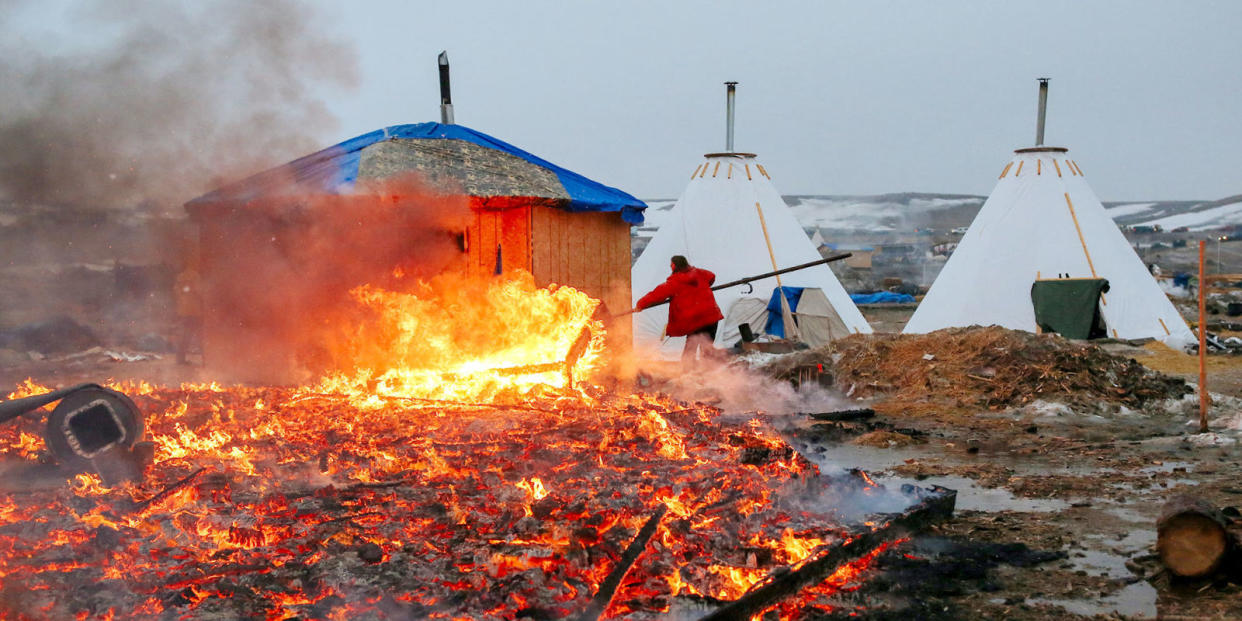The Standing Rock Fire Is Visible All Over the United States

ATLANTA-The battle on the ground against pipelines, and against the money power behind them, which is the more important of the two fights, has coincided with another phenomenon-namely, a revival of large-scale and visible political activism among the Native American tribes, especially in the Plains states of the Midwest. The most visible manifestation, of course, was the Standing Rock protest against the Dakota Access pipeline. On Tuesday, the protesters broke camp, burning their camp in a final act of defiance. James LaMere, of the Winnebago people in Nebraska, had a son who spent four months at Standing Rock. On Thursday, LaMere, the vice-chairman of the Nebraska Democratic Party, still hadn't heard from him.
"I get word from him from time to time and I say, whatever you do, I support it," LeMere said. "I don't understand it, totally, but I support it."
LaMere's activism goes back to the heady days of the 1970s, when the American Indian Movement was formed. AIM became the primary voice for the rights of native peoples and its encounters with political authority were not always peaceful. In February of 1973, AIM activists occupied the site of the Wounded Knee massacre of 1890. Two years later, another incident at the Pine Ridge Reservation in South Dakota ended with two FBI agents and a Native man shot to death. This was the action that sent AIM leader Leonard Peltier to prison for life. In 1978, AIM disbanded. Activism among the tribes continued fitfully ever since, but nothing happened that was at the level of the current movement to protect the water and the land by opposing the projects of the extraction industries. This is what happened at Standing Rock, but Native peoples also were an integral part of the coalition that fought and beat the Keystone XL pipeline, which the administration has said it will arrange to revive. Nebraska is waiting again.
"I can tell you that activism transcends the generations, it just takes a new form now," LaMere said. "In 1973, and the late-'90s, we did not have social media. The explosion of social media has been beneficial to us. The heart, the commitment, the frustration of Native people as regards mother Earth has always been there.
"I can tell you that activism transcends the generations, it just takes a new form now."
"It manifested itself at Standing Rock and it will continue to manifest itself in Nebraska at Keystone. I want to share with you-in Nebraska, when we looked at it, there was the Omahas, the Winnebagos, the Poncas, the Pawnees, the Lakotas, they consecrated the ground on which we live, so that we could grow and flourish. Covenants were made between the people and the Creator of all things, and covenants must be respected. We were stewards of the land in exchange for bountiful harvests and we promised that we would take care of mother Earth. Stewardship has changed now, but the covenant is still there."
It is easy to dismiss this kind of talk as some kind of vestigial quasi-religious incantation instead of serious policy proposals, but the essence of what LaMere makes at least as much sense as letting a foreign company with a terrible safety record run a pipeline full of the world's most poisonous fossil fuel through some of the most arable farmland in the world.
"Covenants have been made and covenants must be respected. We do not live up to it, I believe, mother Earth will simply take it from us. That's how I see it. That's the faith I was raised in. You take care of it, or it will be taken from you. There's a feeling among the new stewards that, maybe, we can fine-tune that covenant, but you can't. The most bountiful harvests in the world are in Nebraska and those come about because of prayers over 10,000 years by the first Nebraskans. It's a complex issue but, when all else fails, figure out why it is the way it is, and why we thrive there."
Given the history that need not be recounted here, it's a wonder that Native people bother with conventional politics at all. But we should be glad that they do. In a vast and ancient sense, they're better citizens than most of us are.
Respond to this post on the Esquire Politics Facebook page.
You Might Also Like

